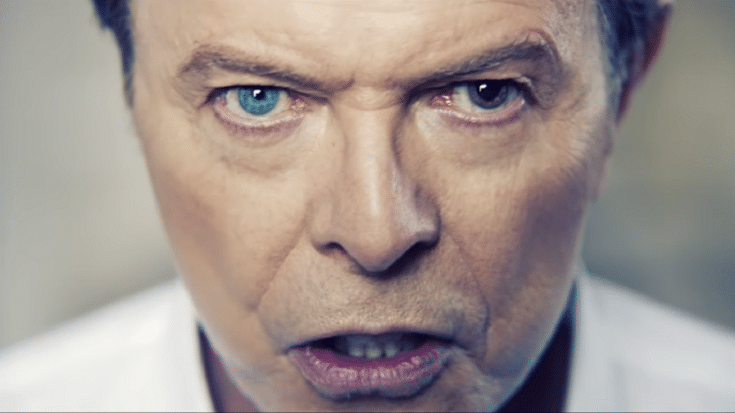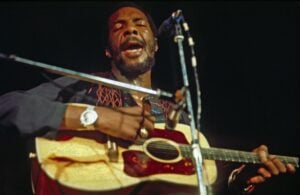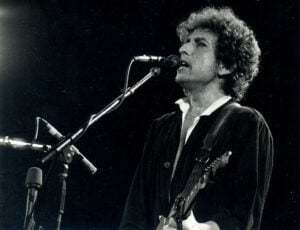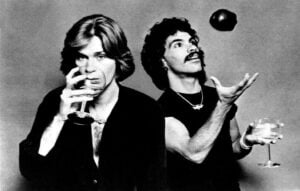10 Famous Musician’s Final Songs and Their Back Story

via David Bowie/YouTube
Being a musician is not like doing a 9–5 job. Since the need to create never goes away for many artists, there is no definite retirement age or end in sight. Inspired by the same things that drove them in their early years, some of the greatest musicians continued to write, record, and perform until the end of their lives.
Some people wrote their last songs knowing that their time was running out because of age or illness. Others left behind unanticipated final pieces that they finished shortly before their tragic death. Regardless of the situation, these songs evolved into something more—parting words, enduring legacies, and intensely intimate contemplations. They are the artist’s last creative expression, whether deliberate or not, which heightens their effect.
Here are a few of the most memorable farewell songs, which are all the more potent because of the context.
Freddie Mercury – “Winter’s Tale”
By early 1991, Freddie Mercury had largely withdrawn from the public eye, brushing off speculation about his health despite noticeable weight loss. In November of that year, he finally confirmed he had AIDS—just a day before his passing at age 45. While Queen continued, it took nearly four years for the remaining members to complete the music he left behind.
During his final months, Mercury found peace in Montreux, Switzerland, where he wrote and recorded songs overlooking Lake Geneva. The last song he ever completed, “A Winter’s Tale,” was inspired by the breathtaking scenery around him. Rather than a somber farewell, the song is a vivid, poetic reflection of life’s beauty. As Queen guitarist Brian May put it, Mercury wasn’t dwelling on his fate—he was simply observing the world around him. Released on Queen’s Made in Heaven (1995), “A Winter’s Tale” became a posthumous hit, reaching No. 6 on the U.K. charts.
John Lennon – “Grow Old With Me”
A six-year break from music didn’t stop John Lennon’s creative spark. Inspired by Rock Lobster by The B-52, he returned to the studio, writing and recording Double Fantasy with Yoko Ono in 1980. Among his unfinished works was Grow Old With Me, a song deeply personal to the couple.
Lennon adapted the lyrics from Rabbi Ben Ezra, a romantic poem by Robert Browning. The song meant so much to him and Yoko that they kept postponing its recording, wanting to give it the care it deserved. Sadly, they never got the chance—on December 8, 1980, Lennon was tragically murdered.
Just weeks later, Ono found his final Christmas gift to her: a framed piece of Browning’s handwriting. Though Lennon never fully recorded “Grow Old With Me,” his demo became the foundation for its release on the 1984 posthumous album Milk and Honey, preserving his heartfelt message forever.
Warren Zevon – “Keep Me in Your Heart”
Warren Zevon may be best known for his 1978 hit “Werewolves of London,’ but his true legacy lies in his sharp songwriting and dark wit. Beloved by fellow musicians and fans alike, he spent decades crafting songs that were both clever and deeply personal.
In 2002, after being diagnosed with terminal lung cancer, Zevon wasted no time—he poured everything into The Wind, his final album. With mortality on his mind, he recorded originals like “Please Stay” and a moving cover of Bob Dylan’s “Knockin’ on Heaven’s Door.” But it was “Keep Me in Your Heart,” the album’s closing track, that became his most memorable farewell—a quiet plea not to be forgotten.
Released on August 26, 2003, The Wind arrived just days before Zevon passed away at 56. His work was honored with five Grammy nominations, including Song of the Year for Keep Me in Your Heart, ensuring his music would live on.
Lou Reed – “Junior Dad”
As the frontman of The Velvet Underground and a groundbreaking solo artist, Lou Reed shaped modern rock with raw, unfiltered storytelling. His songs explored addiction, despair, and life’s darkest corners. By the 2010s, however, Reed’s own health was failing. Hepatitis C left him struggling through painful treatments, and a liver transplant in April 2013 only briefly extended his time. Six months later, he was told there was nothing more doctors could do.
Despite his health battles, Reed wasn’t ready to stop creating. In 2011, less than two years before his passing, he teamed up with Metallica to record “Lulu,” determined to leave behind one last artistic statement. The album’s closing track, “Junior Dad,” became one of his final songs—an understated, emotional reflection on aging, regret, and complicated family relationships. According to filmmaker Julian Schnabel, Reed always felt misunderstood, yet “Junior Dad” remains a deeply personal and poetic farewell from one of rock’s most fearless voices.
Jim Croce – “Name of the Game”
Jim Croce was one of the defining singer-songwriters of the early 1970s, breaking through with hits like “You Don’t Mess Around with Jim” and “Operator.” In 1973, “Bad, Bad Leroy Brown” topped the charts, followed by “Time in a Bottle,” a heartfelt song about how quickly time passes—made even more bittersweet when it hit No. 1 after Croce’s tragic death. On September 20, 1973, at just 30 years old, he was killed in a small plane crash.
Though he was gone too soon, Croce left behind a treasure trove of unreleased music, as well as his 2-year-old son, A.J. Croce, who would grow up to be a celebrated pianist and singer. In 2017, A.J. recorded his father’s final composition, “Name of the Game.” Learning guitar brought him closer to his father’s music, and as he told ASCAP, “It became fun to play through his songs,” keeping Jim Croce’s legacy alive.
Bob Marley – “Redemption Song”
Bob Marley spent the 1970s shaping reggae into a global movement with The Wailers, spreading messages of unity and resistance. In 1977, he was diagnosed with melanoma under his toenail but chose not to amputate. By 1980, the cancer had spread to his lungs and brain. Knowing his time was limited, Marley poured his soul into Uprising, his final studio album, closing it with “Redemption Song”—a powerful reflection on freedom and revolution.
The song features the iconic lyrics: “Emancipate yourself from mental slavery/none but ourselves can free our minds,” adapted from civil rights leader Marcus Garvey. Originally recorded as a reggae track, producer Chris Blackwell encouraged Marley to strip it down—just voice and acoustic guitar—giving it a raw, timeless quality. Released in 1980, “Redemption Song” became a lasting testament to Marley’s vision. He passed away in 1981 at just 36, but his music continues to inspire.
Glen Campbell – “I’m Not Gonna Miss You”
Glen Campbell first made his mark as a session guitarist in the 1960s, even touring with The Beach Boys, before becoming a country music legend. In 2011, he announced his farewell tour, and just months later, he revealed why—he had been battling Alzheimer’s disease for several years, and it had progressed to the point where performing was no longer possible.
Filmmaker James Keach captured Campbell’s final tour in the documentary Glen Campbell: I’ll Be Me. Throughout the journey, people kept asking Campbell about his diagnosis, prompting his longtime collaborator Julian Raymond to recall him saying, “I don’t know what everyone’s worried about. It’s not like I’m going to miss anyone anyway.” That unforgettable remark became the inspiration for “I’m Not Gonna Miss You,” a brutally honest farewell song. Campbell recorded it in just four takes, and it later earned an Academy Award nomination for Best Original Song in 2015. He passed away in 2017 at 81, leaving behind a timeless final message.
Ian Curtis – “Ceremony”
Joy Division’s dark, haunting sound and introspective lyrics made them a sensation in the U.K., with tracks like “Transmission” and “She’s Lost Control” defining their legacy. In early May 1980, they introduced a new song at a Birmingham University gig, listed simply as New One on the setlist—later titled “Ceremony.” Ian Curtis wrote the lyrics, and the band felt it was a creative breakthrough with the potential to be a hit.
That show was meant to be their last before heading to the U.S. for their first tour on May 19. Instead, it became their final performance. On May 18, 1980, Curtis tragically took his own life at just 23 years old. His bandmates, keeping a promise made before his death, regrouped under a new name—New Order—and their first release was “Ceremony,” recorded with Bernard Sumner on vocals. The song became a powerful bridge between Joy Division’s past and New Order’s future.
Prince – “Stay Cool”
After wrapping up his Piano and a Microphone Tour, Prince returned to his Paisley Park home in Minnesota. Just days later, on April 21, 2016, he was found unresponsive in an elevator, having died from an accidental overdose of prescription painkillers—medication he reportedly used to manage pain from hip surgery.
In the months following his passing, fans learned that Prince had left behind unfinished projects. In October 2016, an NBC Today crew was granted access to Paisley Park before it opened as a museum. While filming, a camera operator spotted something remarkable—a handwritten lyric sheet on a music stand for a song titled “Stay Cool.” It remains unclear if Prince intended to record it, but it appears to be one of the last glimpses of his creative mind. At just 57, he left behind an unmatched musical legacy—and perhaps, a song still waiting to be heard.
David Bowie – “I Can’t Give Everything Away”
David Bowie’s final album, Blackstar, was released on January 8, 2016—his 69th birthday. Just two days later, the world was stunned by the news of his passing. Fans soon learned that Bowie had been privately battling liver cancer for 18 months. While undergoing chemotherapy, he spent his afternoons in the studio, crafting what would become his parting masterpiece.
Initially seen as an experimental and enigmatic record, Blackstar took on new meaning after his death. Producer Tony Visconti called it “a farewell gift”, while cover designer Jonathan Barnbrook described it as the work of a man facing his own mortality. The album’s final track, “I Can’t Give Everything Away,” became Bowie’s last artistic statement—an introspective reflection on his life and legacy. With lines like “This is all I ever meant / That’s the message that I sent,” it was a poetic, powerful goodbye from one of music’s greatest visionaries.
Otis Redding – “(Sittin’ On) The Dock of the Bay”
By 1967, Otis Redding was on the verge of superstardom. He had already made waves with “Respect” (later a No. 1 hit for Aretha Franklin) and had found major success with “Try a Little Tenderness.” On December 9, 1967, he performed on Upbeat, a music show filmed in Cleveland. The next day, tragedy struck—his plane crashed into Lake Monona, Wisconsin, killing Redding and most of his band, The Bar-Kays. He was just 26 years old.
Two days before that final performance, Redding recorded “Sittin’ On (The Dock of the Bay)” in Memphis with Steve Cropper. The song wasn’t even finished—Redding had planned to replace the whistling outro with lyrics but never got the chance. Released after his death, Dock of the Bay became the first posthumous No. 1 hit, solidifying Redding’s place as one of soul music’s most unforgettable voices.
Amy Winehouse – “Body and Soul”
Amy Winehouse’s time in the spotlight was short but unforgettable. With her unique blend of jazz, soul, and modern grit, she dominated the 2008 Grammy Awards, winning Record of the Year and Song of the Year for “Rehab,” along with Best New Artist.
Despite her reputation for high-profile feuds, Winehouse deeply admired Tony Bennett. In 2011, she got the chance to collaborate with him on “Body and Soul” for his Duets II album. Nervous before the session, she lit up when Bennett mentioned she reminded him of Dinah Washington, her biggest musical idol. “She was like, ‘Tony understands me,’” he later recalled.
“Body and Soul” became Winehouse’s final recording. Just months later, in July 2011, she tragically died from alcohol poisoning at 27. The song was released on September 14, 2011—what would have been her birthday—serving as a haunting, beautiful farewell to a once-in-a-generation talent.























